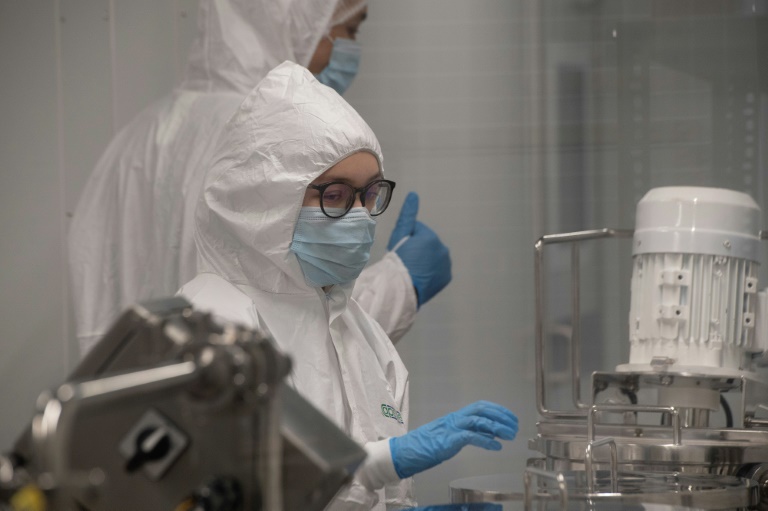South African biotech consortium is working on a messenger RNA jab based on the Moderna formula in a ground-breaking drive to end Africa’s life-threatening lack of Covid vaccines.
Cape Town-based Afrigen Biologics and Vaccines is leading a pilot project, backed by the UN’s World Health Organization (WHO) and the COVAX initiative, which seeks to tweak Moderna’s revolutionary drug.
The goal is an mRNA vaccine that suits poorer countries in hot climates.
It would be a tough, resilient vaccine that would not need to be stored all the time at ultra-cold temperatures — a hefty requirement in places where power cuts are a problem.
Africa is the least vaccinated continent in the world.
More than 10 months after the world’s first Covid shot was administered and nearly two years into the pandemic itself, barely five percent of eligible Africans have been fully immunised.
The problem has exposed Africa’s huge dependence on imported vaccines and its tech weakness compared with Europe, China and the United States.
“The bitter lesson we’ve learnt throughout this pandemic is how Africa was almost 100-percent dependent” on vaccines produced outside the continent, Richard Mihigo, the WHO’s vaccination coordinator in Africa, told AFP.
Research and development at a 130-million-rand ($8.7-million) facility started three months ago, and talks are underway Moderna for a licensing agreement to use the basic formula.
– Tests within a year? –
Twenty-two scientists are working on the huge challenges.
The idea is to have a “super efficient and safe (vaccine that) … will have a different stability and more suitable to be distributed at a temperature which is feasible for Africa,” said Afrigen’s managing director, Petro Terreblanche.
“It will be developed for maximum protection of the variants that is relevant for the territories where variants are rapidly surfacing,” she added.
“What we are looking for is to have a second-generation vaccine,” said Martin Friede of the WHO’s Initiative for Vaccine Research.
“We have to start with a Moderna look-alike and be as close to Moderna as we can get,” he said.
“It’s not a copy of Moderna.”
If all goes to plan, prototype shots will be ready for clinical trials within a year.
If those tests show that the modified jab is safe and effective, vaccine producer Biovac, a neighbour to Afrigen, will be the first to produce it on a commercial scale.
After that Afrigen will train other countries and hand out production licences to poor nations left out in the race for the life-saving shots.
– Patent question –
The Medicines Patent Pool, an international organisation that works to facilitate the development of medicines for low- and middle-income countries, is leading negotiations with Moderna.
Hopefully “we might get from them an agreement not to enforce any of their patents,” Charles Gore, the organisation’s boss, said in Geneva last month.
The Afrigen team say they are “reverse-engineering” the vaccine in a first step to see how it works.
“This is considered R and D (research and development), so there isn’t any infringement of intellectual property and in the process we learn how you make mRNA, to be able to produce it at a scale that would be useful for clinical trials,” said Afrigen’s technical director Karen Fenner.
Pharma giants are facing huge pressure to ease patent controls over coronavirus vaccines to help production in regions scrambling for shots.
Moderna last week announced plans to build a state-of-the-art mRNA facility in Africa to churn out up to 500 million vaccines doses anually.
It did not state where the factory will be stationed nor the initiation date.
The Afrigen project is funded via the COVAX initiative, which aims to facilitate equitable access to vaccines worldwide.
It is the latest vaccine investment in South Africa this year — the country on the continent most affected by the pandemic.
Johnson & Johnson has an operational “fill-and-finish” plant in South Africa, and Pfizer/BioNTech have partnered with Biovac to bottle their mRNA vaccine starting next year.
Biotech billionaire Patrick Soon-Shiong is also planning to start transferring technology to begin vaccine production in 2022.
Elsewhere on the continent, several Covid vaccine production facilities are in the pipeline, including in Algeria, Egypt, Morocco, Nigeria, Rwanda to Senegal.
“Africa needs to become over the next 20 years autonomous in vaccine production,” said Friede.
“This needs to be done, full stop.”










